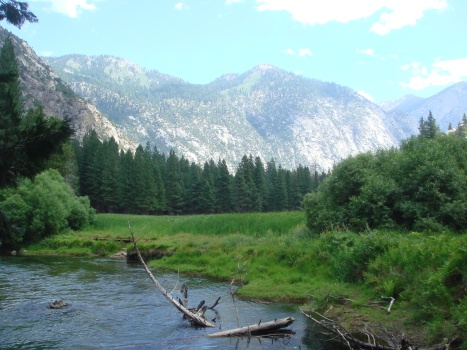

Today is Blog Action Day 2009, an annual event that unites the world’s bloggers in posting about the same issue on the same day. The aim of the organizers, including Change.org, is to raise awareness of said issue, and in so doing, to trigger a global discussion. This year’s issue: Climate Change.
So here’s my take on the story of environmental stewardship, according to the Bible:
God created the earth. (Genesis 1:1)
God created human beings. (Genesis 1:26)
God told human beings to look after the earth. (Genesis 1:28)
Human beings screwed up. (A large portion of the rest of the Bible.)
And that’s that.
Or at least, that’s the (over-)simplified précis.
A theology of ecology, a theology of creation care, is part of—and is consistent with—a grander biblical theology, woven through with themes that can be found throughout Scripture:
It’s about stewardship, about being respectful and responsible with the resources and the gifts that God has given us in his creation. It’s about sharing in God’s appreciation for the world which he called “very good” (Genesis 1:31), and recognizing, “From everyone to whom much has been given, much will be required; and from the one to whom much has been entrusted, even more will be demanded” (Luke 12:48).
It’s about the poor, those who have not are often the hardest hit by the excesses of those who have. The writer of Proverbs said, “Those who oppress the poor insult their Maker” (14:31), and even if we’re not directly treating them badly, such an injunction should at least make us think twice about how we live.
It’s about relationship and community, about a harmonious and healthy interaction not only with the people around us but with the world around us, realizing that what we do with the latter will always impact the former at some level. Jesus said that loving one’s neighbor was akin to loving God (Matthew 22:36-40), so if we love God as we claim to, we will love those with whom we share in the gift of God’s creation.
It’s about children, those to whom Jesus said the kingdom of God belonged (Mark 10:14). I have two nieces and three nephews, aged between 18 months and 13 years, and the world they will inherit depends on what we do with it. To quote a Native American proverb (yes, I know it’s not in the Bible!), “We do not inherit the earth from our ancestors; we borrow it from our children.” Put more bluntly, those that follow us have to deal with our mess. Jesus values children; if I love Jesus, I will also value children, and I will care about what I leave to them.
It’s about justice, about recognizing that when a small proportion of the earth’s population exhaust its resources and the rest have to face the brunt of the consequences, that isn’t right. And when the God you worship, serve and follow, is described as a God of justice,* and when you’re encouraged to “do justice” (Micah 6:8) … well, it should probably make a difference on how we live, shouldn’t it?
Because, on the most encompassing level of all, it’s about God: the one who made the earth and everything in it (Psalm 24:1). Wendell Berry wrote, “our destruction of nature is not just bad stewardship, or stupid economics, or a betrayal of family responsibility; it is the most horrid blasphemy” (Sex, Economy, Freedom, and Community, 98). Whatever we do with what God has made or given—human or otherwise—is a reflection on what we think of God, the Maker and Giver.
I think the world might look very different if we lived like we knew that.
In the beginning, when God created the heavens and the earth … God saw all that he had made, and indeed, it was very good.
(Genesis 1:1, 31)
* I’m not going to post all the references to God’s justice, because that would take up too much space (which says something in itself), but here are a few: Deuteronomy 10:17-19; Leviticus 25; Psalm 37:28, 103:6; Amos 5:23-24; Jeremiah 22:16; Isaiah 58:6-10. You can read more on God as a God of justice here.
Filed under: justice, personal, writing | Tagged: bible, blog action day, change.org, children, christianity, christians, climate change, community, creation care, ecology, environment, faith, god, jesus, justice, kingdom of god, love god, love your neighbor, poor, relationship, stewardship, theology, wendell berry | 1 Comment »
 Last night, I was privileged to lead hundreds of young Christians in a time of lament as part of the Poverty and Advocacy track at Urbana 2009. We came together to cry out to God on behalf of those suffering from injustice and oppression, and particularly, as part of the Human Wrong Initiative, on behalf of millions of children trapped in modern slavery: in forced prostitution, forced labor, or recruited to be child soldiers. We came together to mourn the wrong that we see in the world, following the biblical precedents of the psalmists, of the prophets, and of Jesus, in engaging with God in prayer to seek change.
Last night, I was privileged to lead hundreds of young Christians in a time of lament as part of the Poverty and Advocacy track at Urbana 2009. We came together to cry out to God on behalf of those suffering from injustice and oppression, and particularly, as part of the Human Wrong Initiative, on behalf of millions of children trapped in modern slavery: in forced prostitution, forced labor, or recruited to be child soldiers. We came together to mourn the wrong that we see in the world, following the biblical precedents of the psalmists, of the prophets, and of Jesus, in engaging with God in prayer to seek change.


